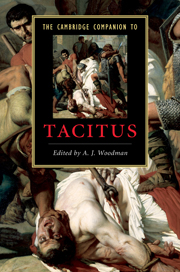Book contents
- Frontmatter
- Introduction
- Part I Contexts
- Part II Texts
- Part III Topics
- Part IV Transmission
- 16 From manuscript to print
- 17 Tacitus and political thought in early modern Europe, c. 1530-c. 1640
- 18 Gibbon and Tacitus
- 19 A dangerous book: the reception of the Germania
- 20 Tacitus and the twentieth-century novel
- 21 Tacitus’ Syme
- Chronological table
- Abbreviations and bibliography
- Index
20 - Tacitus and the twentieth-century novel
from Part IV - Transmission
Published online by Cambridge University Press: 28 March 2010
- Frontmatter
- Introduction
- Part I Contexts
- Part II Texts
- Part III Topics
- Part IV Transmission
- 16 From manuscript to print
- 17 Tacitus and political thought in early modern Europe, c. 1530-c. 1640
- 18 Gibbon and Tacitus
- 19 A dangerous book: the reception of the Germania
- 20 Tacitus and the twentieth-century novel
- 21 Tacitus’ Syme
- Chronological table
- Abbreviations and bibliography
- Index
Summary
“Opus adgredior opimum casibus, atrox proeliis, discors seditionibus, ipsa etiam pace saeuum” (H. 1.2.1) / “I am entering on a work rich in disasters, ferocious in its wars, ripped apart by civil strife, savage even in peace” / Tacitus frames his histories as an account of catastrophic and historic change at home and abroad. In both the Histories, the extant books of which cover the civil wars of 69, and the Annals, which recount the history of the Julio-Claudian emperors, he anatomises the consolidation of and struggle for imperial power and the consequences of Empire for Romans and the peoples they conquered. This grim history offered obvious analogies with the fraught political and social issues of Europe in the 1920s, 1930s and 1940s, when the uneasy peace achieved after the First World War degenerated into economic collapse, social upheaval, the rise of totalitarianism and the cataclysm of the Second World War. The conflagration of Rome, the Pisonian conspiracy and the persecution of the Christians, the paranoia and murderous struggle for power within the Julio-Claudian house, Rome's relentless push for Empire, pitting the imperial might of Rome against freedom-loving but savage natives - these Tacitean motifs provided powerful material for writers of the twentieth century. This essay examines three novelists who based their historical fiction on the works of Tacitus: Robert Graves, Naomi Mitchison and Lion Feuchtwanger.
- Type
- Chapter
- Information
- The Cambridge Companion to Tacitus , pp. 300 - 316Publisher: Cambridge University PressPrint publication year: 2010



